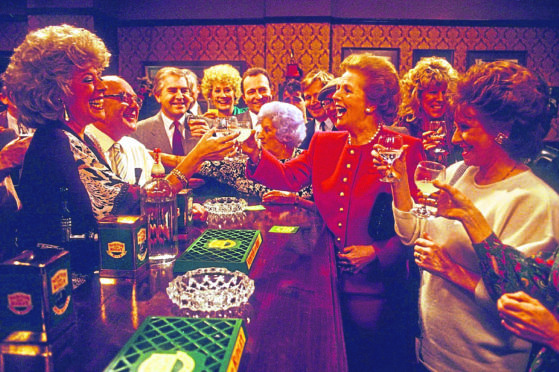J Fergus Lamont, arts critic and author of “Walk On By – Union Street Trading in 2020, a poet’s perspective”
While staying indoors and watching my remaining hair form ever more elaborate curlicues in homage to the great American surrealist Dr Seuss, I have continued to seek succour from the activities of those brave warriors in the performing and visual arts who battle on in the face of this implacable, invisible, viral enemy.
This week, my interest was piqued by news of a television programme that has resumed filming while utilising social distancing methods, including an emphasis on two-character scenes, actors doing their own hair and make-up, and a security guard prodding the cast with a two-foot pole to ensure they keep their distance.
You won’t have heard of it – it has received little or no publicity – but “Coronation Street” is what is described by its producers as a “Soap Opera”, and what could be more apt in these extraordinary times, with hand sanitiser as highly priced a commodity as caviar, than an operatic work about keeping your hands clean.
One can practically smell the zeitgeist.
Having sampled an episode I must report it is the most remarkable piece of musical narrative about the human condition I have ever seen, and I include in that Funbox’s groundbreaking “Dinosaur Safari”.
The libretto is performed entirely as recitative – reminiscent of Stravinsky – but most strikingly, entirely without melodic accompaniment. Indeed, to the unsophisticated ear it may sound as if it is not being sung at all, but spoken in sullen Lancashire-accented working class argot.
This truly radical form of opera provides a powerful metaphor for the difficulties we all now face in accessing the arts and depicts a resilient yet largely miserabilist proletariat, separated from one another yet yearning for community in a mythic nirvana they call “The Rover’s Return”. And truthfully, aren’t we all?
There has been one other extraordinarily striking example of the power of the visual arts on display this week.
One of this country’s greatest guerrilla artist-provocateurs has been giving Banksy a run for his money.
I speak, of course, of the enfant terrible of that contemporary art, easily identifiable by his trademark combination of ill-fitting suit, unruly blonde hair and air of self-satisfied faintly amused privilege popularly known as Boris.
This week, in an act reminiscent of antecedents The KLF when they burned a million pounds in cash in a suitcase on the Isle of Jura, Boris revealed plans to paint a Union Jack-inspired pattern on to a big grey plane at a cost of £900,000.
There has been criticism of this project as “Air Farce One” – but philistinic detractors will inevitably fail to understand the importance of such a monumental piece of public art, clearly intended to lift the spirits of this currently embattled sector and to speak to the nation at large.
This truly eloquent artistic statement challenges us to consider the value of “money” against the value we place on abstract concepts like health, housing, education, governmental credibility and, in a very real sense, human life.
Above all else it is a stark and brutal reminder of the high price we have to pay for the kind of nationalism that is derived more from empty symbols than from genuine achievement.
I wept.
Cava Kenny Cordiner, the football pundit who’s behind closed doors
It’s coming home! It’s coming home, it’s coming! Yes, at last, Old Kenny can finally get his football fix now that the Premiership has returned.
I tried to get into the FungusLiga but it was like watching Auf Wiedersehen Pet without the subtitles.
But at last the light has come out of the end of the tunnel and this weekend I get to watch the proper stuff, like Norwich v Southampton.
Ever since the Codona’s Virus turned into a global pancetta, me and Melody has spent our evenings playing cards, cooking delicious meals together, going for romantic strolls along the banks of the Urie.
So, on Wednesday night, Melody comes to me and says, she says: “Fancy a walk tonight, Kenny?” So I says to her, I says: “Sorry love – it’s Villa v Sheffield United.”
And good on the wee star, she’s let me concentrate on the bountiful game by not speaking a word to me since.
And boy, oh boy, oh boyo, the opening night had everything! A nil-nil draw, some VAR controverbials, a red card and Arsenal getting spanked by Man City.
But magic as it is to have it back, football in this unpresidential times is not the same. If you is asking me, the game needs the fans.
Not just for the atmospherics, but for all that little things what makes football complete – the streaker getting rugby tackled by stewards, the supporter in row Z getting hit in the face by a stray shot and, most importantly, 40,000 people giving the referee absolute pelters.
How I miss that!
